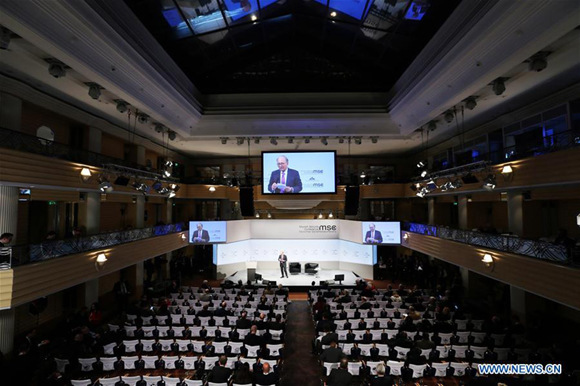
Munich Security Conference Chairman Wolfgang Ischinger makes the closing remarks during the 54th MSC in Munich, Germany, on Feb. 18, 2018. The 54th Munich Security Conference (MSC) closed on Sunday, leaving "a lot more work ahead" in addressing global security issues. (Xinhua/Luo Huanhuan)
China has called for lasting peace and common security for all while reiterating the notion of building a community of shared future for mankind at the just concluded 54th Munich Security Conference in southern Germany.
Efforts to this end, most urgently, include a peaceful settlement of the nuclear issue on the Korean Peninsula through talks, it said at the annual global forum that was held on Feb. 16-18 to discuss security policies.
In this regard, either common security or absolute unilateral security at the cost of others is the core issue when it comes to discussing a denuclearization of the Peninsula, it said.
The ideas reflected China's consistent efforts to safeguard world peace and the postwar international order. Its call for an improved global governance on nuclear security deserves more attention and deliberation. Therefore it came as no surprise that the high-level Munich forum saw support for China's larger role on global security issues.
Meanwhile, allegations by some officials and experts from Western countries that China's peaceful rise is a threat to the postwar world order are ill-founded and a distraction from what is really at stake: global security.
The world today is facing growing uncertainties and destabilizing factors from emerging challenges such as climate change, extremism, terrorism and cyber security. The security challenges today are faced by all countries; many of them cannot be effectively tackled by one country alone. It is critical that the international community make joint efforts to address these challenges that are hampering the globalization process.
A rise in unilateralism, as first seen in trade and economy, is thus becoming a factor that is negatively affecting the global security situation, and must be addressed.
Meanwhile, economic globalization calls for corresponding global security governance in order to boost development worldwide, which is urgently needed to reduce poverty and marginalization, which in turn create hotbeds of violence and extremism.
China's proposals to achieve common security for all and lasting peace at the Munich forum offer a welcome alternative for countries to seek development, growth and prosperity. Its efforts to safeguard world peace and the postwar international order should not be discredited.


















































